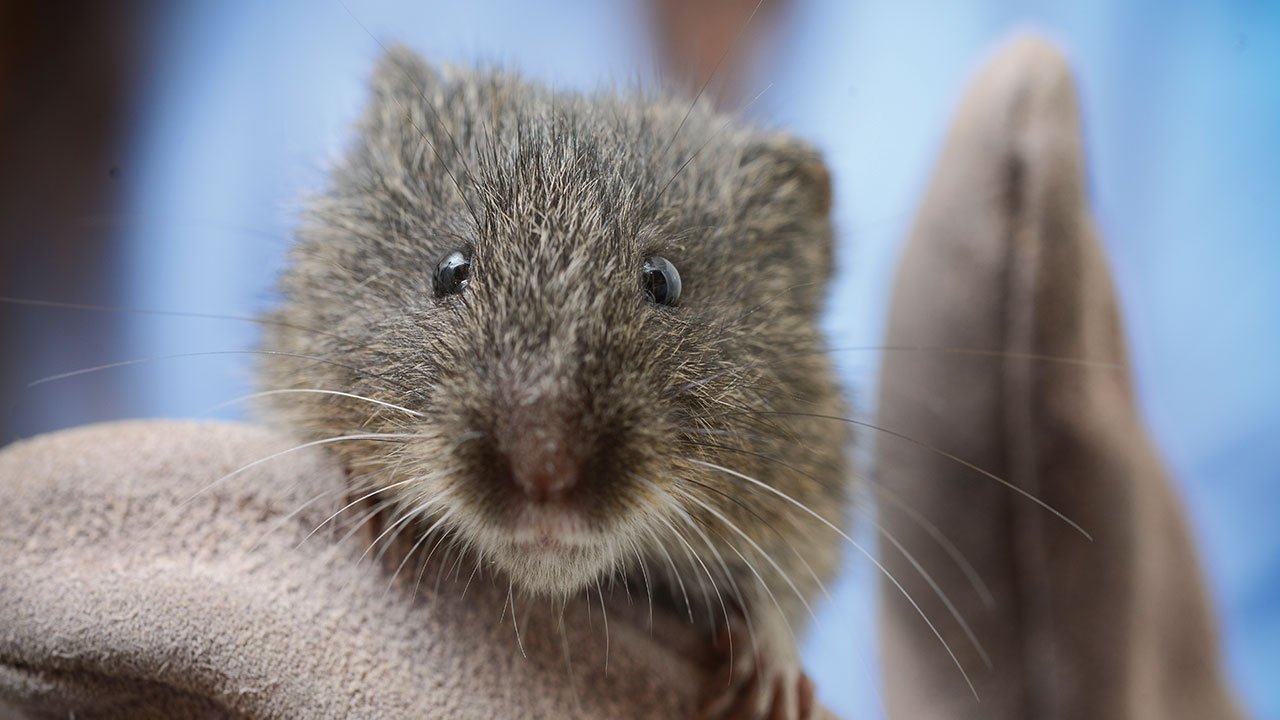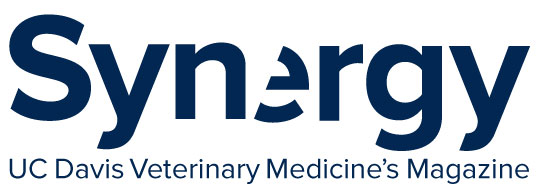
News Bites

Endangered Amargosa Voles Begin to Repopulate Desert Habitat
Seven years of carefully planned habitat restoration in the Mojave Desert have yielded hope for the survival of the endangered Amargosa vole. In early August, a wildlife camera placed by UC Davis researchers revealed the presence of one, possibly two, vole pups born from parents that were reintroduced to the restored Shoshone Spring marsh.
Restoration started in 2015 as a collaborative effort between the landowner of Shoshone Village, and scientists and conservationists from the Amargosa Conservancy, UC Davis and the California Department of Fish and Wildlife (CDFW).
“Amargosa voles live nowhere else on Earth, except these unique Mojave Desert marshes fed by natural springs and the mostly underground Amargosa River,” said CDFW senior wildlife veterinarian Deana Clifford (DVM ’99, MPVM ’00, PhD ’06) and co-lead on the reintroduction effort. “By restoring marsh habitat, not only will we help voles, but we will provide critically needed water and habitat that many other species need and will increasingly rely on in the future to survive the predicted impacts of climate change.”

Pets Help People with HIV Through Two Pandemics
Professor Lynette Hart has spent a career looking at the impact of the human-animal bond. So, when the COVID-19 pandemic hit, she saw a unique opportunity to look at the role pets play for people who had been isolated and stigmatized during a prior devastating pandemic— the HIV/AIDS crisis of the 1980s.
She and her colleagues surveyed close to 150 people across the nation who got the HIV/ AIDS virus before 1996. Most were men. Respondents said they felt far more grief, isolation and stigma during the AIDS pandemic than during the COVID pandemic. What helped them cope? Having a dog. The findings, recently published in the journal Animals, were covered by more than 80 news organizations across the country.
“I don’t think dogs are magically making them better, but dogs are making a difference,” Hart said. “The older HIV/AIDS survivors may also have more coping strategies, and dogs are part of that. They take their dogs on walks and meet people in their neighborhood and remain more socially connected.”

UC Davis Veterinary Hospital Debuts Stomatitis Clinic
The Dentistry and Oral Surgery Service (DOSS) opened a monthly Stomatitis Clinic to improve care for patients with this rampant oral disease and offer cutting-edge diagnostic and therapeutic options. The news of this first-of-its-kind clinic was covered widely in veterinary publications, including DVM360.
Stomatitis can be debilitating to both dogs and cats, but the disease is poorly to incompletely defined. Currently, none of the available treatment methods are fully effective. However, UC Davis is considered the leader in feline chronic gingivostomatitis research.
The allotted time the Stomatitis Clinic offers may be increased to more than two days a month if there is enough demand. Severe stomatitis cases will still be seen by the service on an urgent basis during additional days of the month.
“We hope that clients will be excited that their pet is not only getting groundbreaking treatment for this debilitating disease, but that they are also helping to pave the way toward a cure,” said Dr. Maria Soltero-Rivera, who leads the clinic.

Using Artificial Intelligence to Predict Life-Threatening Disease
UC Davis veterinarians and researchers have discovered a technique to provide accurate early detection of leptospirosis in dogs through artificial intelligence. The groundbreaking discovery was published in the Journal of Veterinary Diagnostic Investigation and picked up widely by media outlets around the world.
Leptospirosis, a disease that dogs can get from drinking water contaminated with Leptospira bacteria, can cause kidney failure, liver disease and severe bleeding into the lungs. Early detection is crucial and may mean the difference between life and death.
“AI-based, clinical decision making is going to be the future for many aspects of veterinary medicine,” said Dean Mark Stetter. “We are committed to putting resources behind AI ventures and look forward to partnering with researchers, philanthropists, and industry to advance this science.”

Preventing Serious Brain Damage from Nerve Agents
The National Institute of Neurological Disorders and Strokes has awarded a five-year, $13.7 million grant for a new UC Davis CounterACT Center of Excellence. The interdisciplinary center will be housed in the veterinary school and focus on new treatments and strategies to prevent long-term brain damage in humans when poisoned by organophosphate chemical nerve agents or pesticides.
These organophosphates are a group of human-made chemicals developed for warfare during World War II and subsequently modified for use as pesticides. They can affect insects and mammals, causing recurrent seizures and nervous system damage. Several drugs are currently available to either prevent or treat these seizures, but they must be given quickly, often within 20-30 minutes of exposure.
“That is usually not the case in a mass casualty event, terrorist attack or an industrial accident,” said toxicologist Pamela Lein, who will serve as the center’s co-director along with neurologist Amy Brooks-Kayal from the UC Davis School of Medicine. “The goal of the center is to develop therapeutic strategies to prevent significant nervous system damage if this standard of care is delayed.”
Researchers are hoping the treatments they develop will also help people who may develop seizures after traumatic brain injuries, stroke, or prolonged seizures secondary to fever, illness or other causes. Results could also help both people and companion animals, particularly dogs and horses, who have drug-resistant seizures.

UC Davis Receives $10M for Pacific Southwest Center of Excellence
The Centers for Disease Control and Prevention recently awarded a new five-year, $10 million grant to the school’s Pacific Southwest Center of Excellence in Vector-Borne Diseases, or PacVec. The center has been collaborating over the past five years with other universities and partners in the Southwest to better manage and prevent mosquito and tick-borne diseases.
“Vector-borne diseases are emerging and spreading at a disproportionate rate relative to other infectious diseases,” said PacVec Director Chris Barker. “These diseases include Lyme disease, Rocky Mountain spotted fever, West Nile virus disease, and St. Louis encephalitis in the continental United States, and dengue in the Pacific Islands. This grant will help us find the best methods to stop these diseases while training the next generation of public-health scientists to lead us into the future.”
The center’s researchers based at UC Davis include Barker and epidemiologist Janet Foley in the veterinary school, insect physiologist Walter Leal in the College of Biological Sciences, and entomologists Geoffrey Attardo and Anthony Cornel in the College of Agriculture and Environmental Sciences. Each of these investigators will lead research projects aimed at the prevention of vector- borne diseases. Collaborating academic institutions include UC Riverside, University of Arizona, Translational Genomics Research Institute, University of Utah, San Francisco State University, and University of the Pacific.

School Reaches New Heights in Research, Philanthropic and Student Support
The UC Davis School of Veterinary Medicine achieved record totals in research and philanthropic funding for the 2021-22 fiscal year, with $89 million received for research and $61.7 million received from philanthropic sources. In addition, the school’s scholarship endowment surpassed $100 million—an important milestone for support of veterinary medical education.
Research funding ranged from support for basic science investigation to clinical innovation to grants focused on human health. The school receives the most research funding of any veterinary school in the nation, and produces more than 700 published papers annually.
Major grants will be used to prevent and manage vector-borne diseases, and develop novel treatments to prevent long-term consequences after chemical nerve agent exposure. Philanthropic support was directed to many purposes, including the addition of Templeton Farms to tackle important problems affecting horse health and supporting the future generation of veterinarians.
For the first time in our school’s nearly 75 years, the scholarship endowment surpassed $100 million, which generated approximately $4 million in philanthropic student scholarships for the 2021-22 academic year. The school and its donors work to address one of the most pressing issues in the veterinary industry today—reducing student debt.
Along with scholarships created by donors, the school also allocates approximately $4 million in aid annually, meaning that in total the school has granted approximately $8 million in student aid for the 2021-22 academic year. Students at the school have seen an overall year-over-year decrease in relative tuition for the last three years, while according to exit survey information, the school’s graduates have seen significant increases in starting salaries.
This commitment to aid and keeping fees stable means that UC Davis veterinary graduates have one of the lowest student-debt loads in the country, along with one of the most optimal debt-to-income ratios.
Philanthropic support has been transformative for the school in many ways, from funding the construction of Gladys Valley Hall, which is the instructional heart of the school, to contributing to numerous medical innovations and breakthroughs through the Center for Companion Animal Health.
UC Davis is currently in the “Expect Greater: From UC Davis, for the World,” comprehensive fundraising campaign. The school’s participation includes its Veterinary Medical Center campaign (read an update on our progress on page 34), which is transforming the current veterinary hospital into a comprehensive center for veterinary medicine unlike any in the world.
